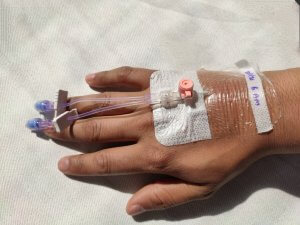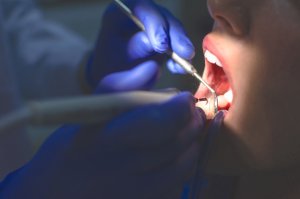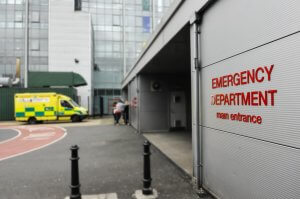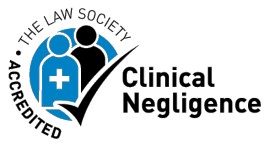Infectious Disease Claims
Infectious diseases are disorders caused by organisms such as bacteria, viruses or parasites. Many organisms live in or on our body. These organisms are normally harmless, and sometimes, helpful to us. Under certain circumstances, they can, however, cause infectious disease.
Strep A
The group of bacteria known as Strep A include a wide range of bacteria, which look like short strings of beads when looked at under the microscope. These bacteria are responsible for a wide range of infections which range in severity from mild to severe and life threatening. Most commonly Strep A causes infections of the skin and throat, such as impetigo or ‘strep throat’. Scarlet fever and rheumatic fever are also caused by these bugs, but thankfully these infections are not the threat to life that they used to be in the past.
Strep A bacteria become dangerous when they invade the body and infect the blood, lungs and other organs. In the worst cases, Strep A infections cause death by shock and organ failure. The headline maker ‘necrotizing fasciitis’ also known as the ‘flesh eating disease’ which is also caused by Strep A, is thankfully not as common as the media coverage would lead you to expect. However, when outbreaks of Strep A infection happen, they can have devastating consequences.
NHS Mid Essex deaths
In September this year, it was confirmed by NHS Mid Essex that 14 people have now died from Strep A infection. In total 37 people in the area have been infected, with symptoms ranging from a simple sore throat, to a high fever and vomiting. All affected are elderly and most were receiving treatment for wounds, either in care homes or in their own homes. It is thought that the infection may have been spread by unknowingly contaminated health care workers who were treating the wounds. Enhanced infection control measures are now in place and a deep clean of nursing bases has been ordered by Public Health England. Hopefully, the infection is now contained, and no other victims are claimed. We will no doubt hear more, when an Inquiry takes place.
Strep B
Strep B bacteria colonise the gut and genitourinary tracts of around one third of healthy adults and cause no harm. In fact, most people won’t realise they have it. The danger arises when the bacteria enter the body, especially in vulnerable people such as children, the elderly and those with compromised immune systems. In these cases, there is a risk of very serious illness and death due to sepsis, lung infection and meningitis.
Strep B and babies
In recent years, the spotlight has been turned on new-borns who have contracted the infection during delivery. Around 25% of women have Strep B in their urinary or vaginal tract without having any symptoms. However, the infection may cause problems with the pregnancy, including stillbirth, miscarriage and early delivery. In addition, according to the American College of Obstetricians and Gynaecologists, these women have a 50% chance of passing the bacteria to their baby. Strep B is especially dangerous in babies and infants who can develop meningitis, pneumonia and sepsis. These conditions can lead to brain damage and in the worst cases, death.
Currently in the UK, between 400 and 500 babies are born infected with Strep B. Each week one baby dies from Strep B infection and another is left with a severe, life-altering disability. Since 2000, there has been a 31% increase in the rate of Strep B infections in babies under 3 months, despite prevention guidelines being introduced in 2003.
Testing mothers for Strep B
Sadly, a simple test can determine whether a pregnant woman is a carrier of Strep B and then steps can be taken to administer antibiotics throughout labour to prevent transmission to the baby.
However, these tests are not routinely performed and currently experts say that there is not enough proof that a national screening programme would benefit mothers and babies.
Although, the test is routinely performed in the USA, Canada, Germany, Spain and France and as a consequence, the rate of Strep B infections in babies has dropped. Currently the infection rate of early Strep B in the UK and Ireland is 2.5 times the US rate and 1.5 times the rate worldwide.
A new study by the Nottingham University is to examine whether Strep B testing is effective and should be a routine part of a mother’s care plan. In the meantime, we will continue to hear of cases such as that of baby Moore who developed sepsis and meningitis just 24 hours after her delivery. The child suffered permanent and severe brain damage as a result. Another family endured the loss of a baby days after he was born, due to sepsis caused by Strep B infection. The infection resulted in the child suffering severe brain damage and he was removed from life support 4 days after his birth.
Raising awareness
Then there is the highly publicised case of Olympic sprinter Iwan Thomas’s new-born son, which has helped to raise awareness of the condition. Shortly after his birth Thomas’s son was admitted to intensive care because of breathing problems. The cause was Strep B. That night, Thomas read up on Strep B cases and was terrified to find out that ‘one in 10 babies die after treatment’.
Thomas also described ongoing concern that his infant son could develop further health complications as a result of the infection. Conditions that can arise from a Strep B infection include cerebral palsy and other forms of brain damage. These conditions reflect damage that arose from the infection, but only come to light as the child gets older. Thomas said that neither he nor his partner were aware that Group B Strep was a potential problem and if they had known about it, they would have arranged to have a private test, which costs as little as £35 and if offered routinely by the NHS would cost just £11, according to the Group B Strep Support charity.
Sepsis Claims
One of the potential symptoms of any infection, including Strep A and Strep B, is sepsis. Sepsis is a highly dangerous life-threatening condition, which arises as the body responds to infection. What happens is this: the immune system identifies an invading bacteria or virus and mounts an inflammatory immune response which inadvertently causes damage to the body’s own organs and tissues. Symptoms of sepsis can include a high fever, increased breathing and heart rate and confusion. Sepsis can reduce blood flow to organs, causing tissue damage.
The risk from death from sepsis depends on the severity and if it responds to treatment: for severe sepsis the death rate can be as high as 50%, and for septic shock as high as 80%. However, if the symptoms are recognised early and treated correctly, most people will make a full recovery. Even so, in the UK 5 people every hour dies from sepsis.
Sepsis deaths
The actor Jason Watkins recently shared a devastating story about his two-year-old daughter. Toddler Maud died 8 years ago. She had been suffering from a sore throat and shortness of breath. Her parents took her to hospital on two occasions, but she was discharged home with antibiotics. Sadly, she died during the night in her bed. The cause was sepsis.
In another harrowing story, an 11-year-old boy injured his ankle while dancing. Shortly afterwards he developed a fever. Over the next few days his condition worsened, and he died from septic shock. The NHS Trust admitted that ‘early signs of sepsis’ were evident on his visit to hospital and that if he had been treated promptly it is likely that he would have survived.
Has anything like this happened to you or to someone close to you?
Have you or someone close to you suffered long term consequences due to inadequately treated infection? Has someone died that could have otherwise lived if the infection had been spotted on time? If medical negligence has resulted in injury or death, you may be able to claim compensation. For infectious disease & sepsis claims to be successful it must be shown that a duty of care was owed the patient and that duty of care was breached, for whatever reason, resulting in harm. If you think you may have a case for compensation as a result of medical negligence, please get in touch with our specialist team. We are ready to hear from you and we want to help. Call 020 7485 8811 or complete our online contact form.
Our Promise to You
- We will review your potential sepsis claims by advising you on the NHS complaints procedure or other alternative procedure if your case does not relate to NHS care and treatment.
- We will not charge a fee for our time in reviewing your case.
- We can assist you with any issues that you may have regarding the complaints procedure or that you encounter in obtaining copies of your medical records.
- We will advise you of the course of action in respect to your case.
Contact us
Call us 020 7485 8811
Email us Send us an email and we’ll get back to you
“The team is very quick and efficient in responding."
"Obsbornes Law is always client-focused and works tirelessly to obtain the best outcomes for clients."
‘They are ambitious for their clients and expect high standards from all who work with them.’
"Osbornes somehow combine the accessibility of a local firm, with the professional standards of a national or city outfit."
"Osbornes, is described as having ‘superb judgement and a medical knowledge that is second to none."
Stephanie has developed a particularly strong reputation for her handling of birth injury claims, as well as cases concerning surgical negligence and delays in surgery.
"An excellent firm which achieves fantastic outcomes for clients."
"Stephanie Prior takes on complex cases and gets excellent results. She has a background in medicine which serves her clients well and is a realistic but tough litigator."
"Stephanie Prior is hugely dedicated, adored by her clients, tenacious, efficient and extremely knowledgeable."
"Stephanie Prior is very good with troubled clients and is easily able to make them feel at ease."
"Stephanie shows sensitivity and deals with things in an understanding way."
Osbornes provides a very intimate and personal client service which is increasingly rare in this sector.
The lawyers in the team are highly experienced and will drive cases very hard on behalf of their clients.
"Stephanie Prior has a realistic attitude to the complexities of the cases. She wins the trust of her clients and goes the extra mile to ensure they get the best outcomes."
"Stephanie Prior... manages a varied caseload, including obstetric claims, child and adult brain injury cases and fatal and non-fatal spinal cord injury cases."
"Stephanie is experienced, knowledgeable of all aspects of clinical negligence work, and strategic in running cases."
"An exceptional outfit. They take on difficult cases, fight hard and win."
"The team were extremely professional in putting my needs first. There was a joined-up approach to catering for the client, and all lawyers involved were briefed and constructive."
Stephanie Prior is always very professional and kind. Highly recommended.
Quite simply excellent, with a highly competent and well-rounded team. They understand complex medical litigation and have been our lifesavers, and we will always owe them our immense gratitude.
News & InsightsVIEW ALL
- 9.6.2023
Early Notification Scheme – is it helping or failing...
What is the Early Notification Scheme? The NHS Early Notification Scheme (“ENS”) has reached its sixth anniversary. Established in April 2017,...
Read more - 5.6.2023
Are pharmacy closures putting patients at risk?
It has been reported in the press that chemist closures will have an impact on patients living in deprived or...
Read more - 11.4.2023
Osbornes Instructed After Local Authority Data Breach
Osbornes Law have recently negotiated a settlement on behalf of two clients who had their personal information inadvertently released to...
Read more - 23.3.2023
Private Pregnancy Scans and Substandard Care
In the news, it has been reported that private clinics that offer pregnancy scans to women are not meeting the...
Read more - 7.3.2023
5-figure settlement for infusion leak to mother
Elline Demetriou has reached another successful outcome for a Claimant, who pursued a post C-section birth injury to mother claim...
Read more - 14.2.2023
The risk of extravasation injuries during iron infusion...
Many patients with low iron, particularly during pregnancy or postnatally, may be advised they need an iron infusion such as...
Read more - 9.2.2023
Perineal Tear case settles for 6-figure sum
Stephanie Prior recently settled a birth injury claim relating to a woman who delivered her baby after a traumatic labour....
Read more - 23.1.2023
Court avoided after settlement agreed in dental negligence...
The Medical Negligence team have recently negotiated the settlement of a complex dental negligence case. Our client experienced a number...
Read more - 13.1.2023
Delayed cancer diagnosis results in five figure settlement
The medical negligence team at Osbornes Law has recently settled a case involving a patient who passed away following a...
Read more - 14.12.2022
Successful settlement for negligent care during kidney transplant...
Claimant v Royal Free London NHS Trust Osbornes have reached a settlement agreement on behalf of a Claimant who brought...
Read more - 10.11.2022
Successful claim against dental practice after negligent treatment
Osbornes Law have reached another successful outcome for a client, who pursued a claim against dental practitioners due to medical...
Read more - 9.11.2022
Transfer time from ambulance to A&E causing...
The Healthcare Safety Investigation Branch (HSIB) have identified that patients may come into risk of harm whilst waiting in ambulances...
Read more - 9.11.2022
Breast cancer screening mammograms and negligence
Breast cancer screening has improved significantly in the UK due to research bettering the understanding of this terrible disease, which...
Read more - 28.9.2022
Women more likely to have symptoms ignored by...
An increasing number of women in the UK feel brushed off by GPs when presenting with real symptoms, with many...
Read more - 21.9.2022
Are maternity services safe? – Part 2
In April last year I wrote a piece about government setting up a taskforce to look into why there are...
Read more - 8.9.2022
Poor interpretation of CTG can result in stillbirth...
Poor interpretation of a Cardiotocograph, more commonly known as a CTG, is a leading cause of stillbirth and brain injuries...
Read more - 9.8.2022
New interactive rating tool reveals NHS wait times...
Amidst record-breaking heatwaves and a lengthy patient waiting list due to COVID backlogs, it is not surprising that this summer...
Read more - 1.8.2022
Successful settlement for birth injury that led to...
Stephanie Prior’s case relating to the death of Gabriela Pintilie has settled and has been approved by the High...
Read more - 14.7.2022
Insulin overdose in hospitals due to limited staff...
A century ago, insulin was first used to treat a 14-year-old boy dying of type 1 diabetes A hundred years later,...
Read more - 6.7.2022
GP Negligence claim leading to fatality successfully settled
Osbornes acted for a Claimant who brought proceedings on behalf of the estate of her late son, X, relating to...
Read more - 6.7.2022
NHS aims to reduce waiting times with Elective...
The NHS recently recorded their waiting list to be at 6.5 million, a record high. Much of this backlog is due...
Read more - 29.6.2022
Nottingham Maternity: Donna Ockenden to Chair Independent Inquiry
An interim report on the state of maternity services at Nottingham University Hospitals NHS Trust has just been released. However,...
Read more - 23.5.2022
Justice for client who suffered serious birth injuries
The Clinical Negligence team at Osbornes Law have recently negotiated the settlement of a case in which our client sustained...
Read more - 28.4.2022
Calls for Public Inquiry into Vaginal Mesh Surgery
A leading professor from the University of Oxford has called for a public inquiry into the use of vaginal mesh...
Read more
































